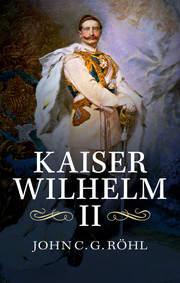Book contents
- Frontmatter
- Dedication
- Contents
- List of figures
- Acknowledgements
- Preface to the English edition
- Preface to the German edition
- Acknowledgements
- Overview: Wilhelm the Last, a German trauma
- Part I 1859–1888: The Tormented Prussian Prince
- Part II 1888–1909: The Anachronistic Autocrat
- Part III 1896–1908: The Egregious Expansionist
- Part IV 1906–1909: The Scandal-Ridden Sovereign
- Part V 1908–1914: The Bellicose Supreme War Lord
- 17 The Bosnian annexation crisis (1908–1909)
- 18 The ‘leap of the Panther’ to Agadir (1911)
- 19 The battlefleet and the growing risk of war with Britain (1911–1912)
- 20 Doomed to failure: the Haldane Mission (1912)
- 21 Turmoil in the Balkans and a first decision for war (November 1912)
- 22 War postponed: the ‘war council’ of 8 December 1912
- 23 The postponed war draws nearer (1913–1914)
- 24 The Kaiser in the July crisis of 1914
- Part VI 1914–1918: The Champion of God’s Germanic Cause
- Part VII 1918–1941: The Vengeful Exile
- Notes
- Index
22 - War postponed: the ‘war council’ of 8 December 1912
Published online by Cambridge University Press: 05 September 2014
- Frontmatter
- Dedication
- Contents
- List of figures
- Acknowledgements
- Preface to the English edition
- Preface to the German edition
- Acknowledgements
- Overview: Wilhelm the Last, a German trauma
- Part I 1859–1888: The Tormented Prussian Prince
- Part II 1888–1909: The Anachronistic Autocrat
- Part III 1896–1908: The Egregious Expansionist
- Part IV 1906–1909: The Scandal-Ridden Sovereign
- Part V 1908–1914: The Bellicose Supreme War Lord
- 17 The Bosnian annexation crisis (1908–1909)
- 18 The ‘leap of the Panther’ to Agadir (1911)
- 19 The battlefleet and the growing risk of war with Britain (1911–1912)
- 20 Doomed to failure: the Haldane Mission (1912)
- 21 Turmoil in the Balkans and a first decision for war (November 1912)
- 22 War postponed: the ‘war council’ of 8 December 1912
- 23 The postponed war draws nearer (1913–1914)
- 24 The Kaiser in the July crisis of 1914
- Part VI 1914–1918: The Champion of God’s Germanic Cause
- Part VII 1918–1941: The Vengeful Exile
- Notes
- Index
Summary
In the belief that a continental war was imminent, on 21 November 1912 the Kaiser ordered ‘that the ambassadors in Paris and London must be ordered at once to ascertain with absolute clarity and to report to me, whether in such circumstances Paris would definitely go along with Russia immediately, and what side England will take’. At the same time Wilhelm asked his brother, Prince Heinrich of Prussia, who was about to pay a visit to England, to find out what line Britain would take in a war arising out of the tumult in the Balkans. In London on 4 December 1912 Heinrich asked his brother-in-law, the First Sea Lord, Prince Louis of Battenberg, point-blank whether Britain would remain neutral in such an eventuality. Alarmed, Battenberg immediately wrote to his cousin, King George V, saying that Heinrich and Wilhelm evidently did not understand that, ‘if War were to break out between Germany & Austria v[ersus] Russia & France, we here cannot permit either of the two latter countries, especially France, to be crippled – consequently we cannot stand out in certain circumstances’. The king gave the Prussian prince the same reply, almost word for word, when Heinrich asked him the same crucial question at Sandringham on 6 December 1912. Later he told the foreign secretary, Edward Grey, that Heinrich had asked him ‘whether, in the event of Germany and Austria going to war with Russia and France, England would come to the assistance of the two latter Powers. I answered “undoubtedly, Yes – under certain circumstances.” […] Of course Germany must know that we would not allow either of our friends to be crippled.’ In a presumably well-meaning but highly irresponsible manner, Heinrich gave his brother the Kaiser a distorted version of this clear statement by the king: England was peaceable, he said, and wished to avoid any conflict with Germany.
- Type
- Chapter
- Information
- Kaiser Wilhelm IIA Concise Life, pp. 139 - 142Publisher: Cambridge University PressPrint publication year: 2014



